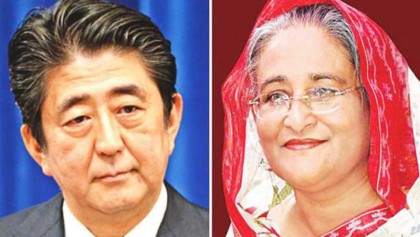Abe phones Hasina as Japan offers ‘rare’ aid for Covid-19

Japan which is known as the largest bilateral development partner of Bangladesh has come up with a new way of supporting the country for the Covid-19 crisis.
Prime Minister Shinzo Abe on Wednesday phoned his counterpart Sheikh Hasina and conveyed Tokyo’s support with 35 billion yen (approximately $330 million) to implement the economic stimulus package announced for the pandemic.
“This is the first time in the history of Official Development Assistance (ODA) that such a loan has been provided in this form for the continence of the government of Bangladesh,” the Japan embassy said after signing of the ‘exchange of notes’ between Ambassador Ito Naoki and ERD Secretary Fatima Yasmin in Dhaka.
“The purpose of the financial assistance signed today is to provide funding for additional financial expenditure by the government of Bangladesh to implement the economic stimulus package.”
“Unlike project loans, which are commonly used, this aid is very flexible in its use with the only conditions being a prohibition on items such as military use,” the embassy said.
The conversation took place ahead of the 75th anniversary of the tragedy in Hiroshima, the day, August 6, when the atomic bomb was dropped on the city of Hiroshima in 1945.
The tragedies of Hiroshima and Nagasaki are well known to Bangladeshis since those were in the texts of elementary schools. The ambassador in a separate message said the day is also “significant” for Bangladesh, Japan ties.
Bangladesh and Japan have a long history of relations since independence. It took a new turn in 2014 when Prime Minister Abe visited Dhaka. During the visit in September, Prime Minister Hasina announced to withdraw Bangladesh’s bid at the UN non-permanent membership election to back Japan.
Abe also rolled out a massive economic package for Bangladesh’s infrastructural development. Bangladesh is also the ‘centerpiece’ of Japan’s Bay of Bengal Industrial Growth Belt (BIG-B) - a grand design of Abe to combine the two oceanic regions – the Pacific Ocean and the Indian Ocean – for more geopolitical space to boost its economy.
The largest Bay in the world, Bay of Bengal forms the north-eastern part of the Indian Ocean. Bangladesh is located in the north of this Bay.
Bangladesh was “very important” for him for its location between South East Asia and India.
The 35 billion yen loan for the COVID-19 Crisis Response Emergency Support comes with “very favorable” terms, the embassy said.
The interest rate is 0.01% and the repayment period is 11-year after the grace period of four years.
The government of Japan hopes that the spread of the coronavirus in Bangladesh will be brought to an end soon and that the financial support will contribute to a return to the remarkable development of Bangladesh over the past decade.
The embassy said the loan will be co-financed with ADB to enable rapid and effective utilization of the loan to counter the pandemic.
Up to the present, the government of Japan has provided approximately $13 million as the emergency support to tackle COVID-19 in Bangladesh through international organisations, and provided PPE to hospitals through JICA.
Additionally, on July 16, Japan and Bangladesh signed the Exchange of Notes on Japanese Grant aid “Economic and Social Development Programme” (approximately $10 million) for the medical equipment including CT Scanners, and X-ray Machine.
These aids are focused on the medical and health sectors currently combating the novel coronavirus, the embassy said.
During the nearly 25-minute telephonic talks from 1.05 pm, the two premiers discussed issues related to COVID-19 pandemic, bilateral economic cooperation, and the projects being implemented with Japanese assistance.
Hasina sought more investment from Japan to further bolster economic ties, her Press Secretary Ihsanul Karim told the state news agency BSS.
She also put emphasis on further strengthening bilateral cooperation. She apprised Abe of the current Rohingya situation.
Abe conveyed that he would talk to the Myanmar leadership to solve the protracted Rohingya crisis, according to the press secretary.
The prime minister also thanked Abe for providing protective equipment like PPE, masks and goggles to Bangladesh to contain the transmission of COVID-19.
She also hoped that the 2020 Summer Olympics, which was scheduled to be organised this year in Tokyo but was postponed due to COVID-19 pandemic, will be held in 2021 in Japan on time.
Hiroshima Day significant for Japan, Bangladesh ties
The Japanese ambassador in a message ahead of the Hiroshima Day said when he came to Bangladesh last year, it was a “delightful surprise for me to learn that so many Bangladeshi people know about the tragedies of Hiroshima and Nagasaki.”
“I realized that the stories of the atomic bombings during World War II and even SASAKI Sadako’s paper cranes are on the textbooks, which Bangladeshi students study in elementary schools. Also, many Bangladeshi people have been commemorating the tragedies of Hiroshima and Nagasaki on August 6th as `Hiroshima Day’ over decades.
“That compassion the citizens of Bangladesh showed to the tragedies in Japan means a lot to us. Thus this `Hiroshima Day` in Bangladesh is significant for our long-standing partnership,” he said.
“As humanitarian crises and pandemics spread across national borders, and armed conflicts do not cease to occur, it seems that it is becoming more and more important to think and share thoughts about peace together across our global community.
“I hope that we, people of Japan and Bangladesh, stand together to make this world more peaceful and harmonious for all,” he said, adding that the tragedies of Hiroshima and Nagasaki must never be repeated.
“As the only country that has experienced the horror of nuclear weapons, Japan has a mission to work closely with other countries and citizens toward the realization of a world free of nuclear weapons.”




